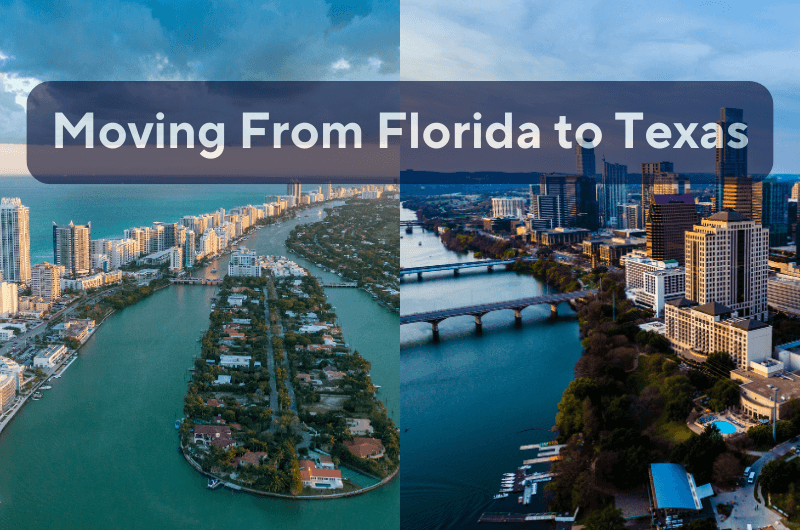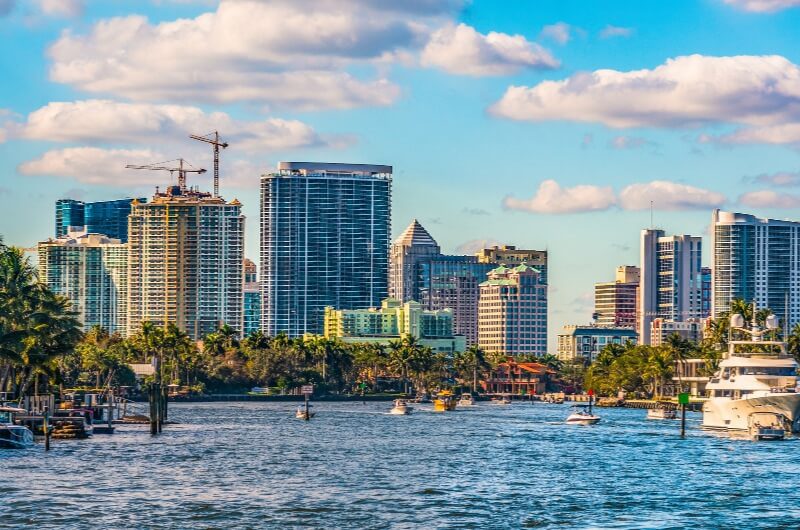Interstate moving takes a lot of work. You have to plan your move, get to know your movers, and figure out all the important services you’ll need. If you’re leaving the Sunshine State for the Lone Star State, you can count on pros like Adams Van Lines to get your stuff there in one piece.
At Adams Van Lines, we know a thing or two about moving. We’ve been in the industry for over 20 years, and in all that time, we’ve built relationships with the best movers in the business. We’ve also learned how you can keep your move stress-free and easy.
If you’re ready to head out west, hold your horses for a minute – take some time to read through our guide to learn how you can keep your Texas-sized relocation from becoming a Texas-sized headache.
How Much Does It Cost to Hire Movers from Florida to Texas?
Moving from Florida to Texas is an exciting adventure, and for between $1,000 and $5,000 it’s downright affordable. Your final price will depend on how far you’re going and how much you’re hauling, but there’s plenty to see and do in the Lone Star State to make your move worth it.
In the moving industry, a long distance move is defined as anything over 100 miles or across state lines. Unlike local moving, long distance moves are charged by distance traveled and weight carried. If you’re moving a studio apartment from Pensacola to Beaumont, it’ll be a lot cheaper than moving a five-bedroom house from Miami to El Paso.
How Long Does Moving Take?
In terms of time, a Florida to Texas move will take between 1 and 21 days, sometimes more, and sometimes less. Like the price of your move, it all comes down to how far you’re going and how much you’re hauling – but not quite how you’d expect.
When movers transport smaller moves, they bundle them together in the same truck. It’s more efficient, and it means they can handle more moves for more clients.
However, this also means there may be delays while they pick up and drop off moves along the way. So if you have a tiny studio apartment’s worth of stuff, it may actually take longer than if you had five bedroom’s worth.
Weirded out about sharing a space with strangers? Don’t worry. Your movers will take the time to carefully partition the semi trailer, and they’ll use cardboard and bubble wrap to keep everything secure.
What Factors Affect the Cost of a Florida to Texas Move?
The moving quote is one thing, but extra services can add a pretty penny to your final cost. Take a look at these factors behind the cost of your move, and prepare your wallet accordingly:
1. Distance of the Move
One of the biggest factors behind your cost is the distance between your origin and destination. Florida to Texas can be anywhere from about 800 to 1,300 miles, depending on your exact locations. More mileage means more fuel usage and wear and tear on the moving truck.
2. Volume and Weight of Belongings
Aside from the distance, the volume and weight of all your stuff is another major factor behind the price. More, or heavier, items will call for larger moving vehicles (and sometimes more movers) which will increase the price. Long distance moves are charged based on weight and distance, so try to downsize before you book.
3. Packing Services
Many movers offer professional packing, too. This will cost you, but it also provides some much-needed peace of mind. Plus, since packing is usually the toughest part of a move, it’s a real weight off your shoulders – literally and figuratively. If you have any delicate or fragile items, you’ll also really benefit from having some professional packing.
4. Moving Supplies
Quality moving supplies like boxes, packing tape, bubble wrap, and moving blankets are much-needed for a successful move. Some movers provide these at an additional cost, while others may include them in a package deal.
5. Storage Services
Sometimes, you need a little extra flexibility. Some moves require storage solutions, whether for a short period or for extended durations. Some moving companies provide storage services so you have a place to keep the excess, and if you look in the right place, you can get a few weeks free.
6. Specialty Items
Pool table? Artwork? Better call the pros. Moving specialty items, such as pianos, pool tables, or artwork, can incur additional fees due to the specialized skills, equipment, and extra care required to transport them safely.
7. Moving Insurance
Different moving companies offer various levels of insurance, but the bare minimum is usually about $0.60 per pound of items lost, damaged, or destroyed. Unfortunately, this means if your 4-pound macbook gets damaged, you’ll only get $2.40. Talk to your movers about full-value coverage: It may cost you a little extra, but it’s worth it.
8. Time of the Move
The timing of your move can also impact the price. Peak moving season usually extends from June to August, with a bit of overlap in May and September. We recommend a mid-week, mid-month move, planned well away from the summer and major holidays.
9. Additional Services
You may need other additional services like disassembling/reassembling furniture, disconnecting/connecting appliances, and handling items that require additional personnel or specialized moving equipment. Every move is different, and these add-ons will also add to the cost.
10. Unforeseen Expenses
Sometimes unexpected expenses can arise. If your city doesn’t allow large semis to park outside your new building, you’ll have to pay for a shuttle, a smaller truck used to carry stuff from point A to point B. You may also need to pay a fee for extra flights of stairs or elevators. It’s a good idea to talk your movers through the whole process ahead of time so there are no surprises.
Why Do People Move from Florida to Texas?
Florida’s a great state, but people are moving to Texas for a reason. Check out why the Lone Star State is getting new residents:
Cost of Living: Texas often has a lower overall cost of living compared to Florida, particularly in aspects like housing and healthcare. Depending on where you decide to set down roots, you can save big.
Job Opportunities: With burgeoning sectors like technology, healthcare, and manufacturing, Texas offers a robust job market and diverse career prospects. The whole state is an attractive area for job seekers and professionals.
Business Environment: Texas appeals to entrepreneurs and companies due to its regulatory ease and innovation-friendly environment. The Lone Star State offers a conducive platform for startups and established businesses to flourish.
Educational Prospects: Renowned universities and research institutions are scattered across Texas, so it’s a prime destination for students and academics. You’ll find a wide array of educational opportunities and resources.
Geographic and Climatic Variation: Florida has great weather, but Texas is pretty underrated. There’s a wide a variety of geographic and climatic options, providing new residents with choices ranging from arid desert areas to lush, green landscapes.
If we took the time to list out every reason people are moving to Texas, we’d need a lot more megabytes. While the above list is by no means complete, it should give you a good idea of what you can expect from living in Texas. And if you’re looking for things to do, we’ve got you covered, also…
Things to Do in Texas
Historical Exploration: Texas has a long and storied past, and this is your chance to be a part of it. Engage with Texan history by visiting iconic sites like the Alamo, and check out the numerous museums throughout the entire state.
Natural Wonders: Texas has natural beauty in droves. Explore the Natural Bridge Caverns or embrace the great outdoors at Big Bend National Park, with its stunning landscapes and wildlife.
Culinary Adventures: No Texas to-do list would be complete without barbecue. Dive into the diverse Texan culinary scene, from savoring world-renowned barbecues to experiencing the unique fusion of Tex-Mex cuisine.
Cultural Experiences: Experience the vibrant cultural scene in cities like Austin, known for its live music, and Houston, with its renowned museums and theaters. It’s a huge state, so of course it’s a melting pot, too.
Sports Enthusiasm: Whether it’s cheering for the Dallas Cowboys or the San Antonio Spurs, Texas is all about team spirit. And as we just mentioned, there’s plenty of delicious game-day grub.
Tech and Business Insights: Move over Silicon Valley. When you’re in the Lone Star State, tech and business hubs in cities like Dallas and Austin can connect you with innovations and opportunities in various sectors.
Festivals and Events: Participate in diverse festivals like Austin City Limits or the Texas State Fair, which celebrate the state’s music, food, and cultural richness.
Moving to Texas from Florida introduces you to a state where history, nature, and contemporary life blend seamlessly. Whether you’re a history buff, nature lover, foodie, or avid sports fan, Texas has something for everyone.
Florida to Texas FAQ
What is the cost of living like in Texas compared to Florida?
The median home price in Texas is about $302,000 – much cheaper than the Florida median of $415,000. Aside from home prices, Texas is typically cheaper than Florida all across the board, and there’s a lot of variety for living situations and lifestyles.
What are the best neighborhoods or cities to live in if I’m moving to Texas from Florida?
Cities like Austin, Houston, and San Antonio are popular among newcomers to Texas. Each offers distinct lifestyle, career, and social prospects. We recommend taking some time to explore the state and see which region suits you best!
What is the cheapest way to move long distances?
DIYing a move is always going to be your cheapest choice. However, once you factor in the price of the truck rental, the price of the gas, the price of your hotels and meals, and the amount of work you’re missing when you’re handling your move, the savings don’t always warrant the effort. Hiring a full service mover may be a bit pricier, but it’s worth it.
How far in advance should I hire movers in Florida?
Ideally, you should try to plan and book your move about three months in advance. When you provide a big window, you get more time to pack (or procrastinate, if we’re being honest), and you may even net a decent discount or two for flexibility.
What items can’t be moved long distances?
Every mover is different, but there’s a few solid rules to keep in mind for what can and can’t be transported. Nothing flammable, nothing pressurized, nothing alive, and nothing perishable. Aside from these, it’s a good idea to keep your important documents and heirlooms with you, instead of in the moving truck.
Ready to Head from Florida to Texas? Get Packing and Let’s Get Started!
Ready to head out west? Now that you’ve seen the guide and learned a bit about planning and pulling off your Florida to Texas move, all you have to do next is shop for some movers and compare quotes!
If you’re ready to get started, check out our quote calculator and start budgeting for the big day. Don’t forget to check back in with the Adams Van Lines team for more helpful tips and tricks to make your move even easier!


